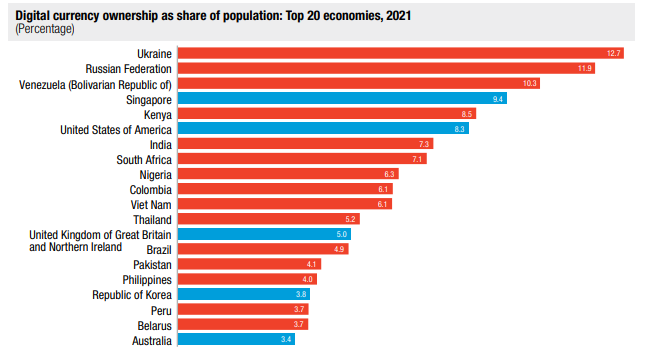Kenya Has Highest Proportion of Crypto Owning Citizens in Africa UNCTAD Data Shows – Emerging Markets Bitcoin News
The latest data from the United Nations Conference on Trade and Development (UNCTAD) suggest that Kenya has the highest proportion of crypto-owning inhabitants than any other African country. To counter the growing use of cryptocurrencies, UNCTAD said it recommends the imposition of taxes that discourages crypto trading.
‘A Way to Protect Household Savings’
According to the data in the latest (UNCTAD) policy brief, Kenya’s digital currency ownership as a share of the population of 8.5% is the highest in Africa and the fifth-highest globally. Only Ukraine with 12.7%, Russia (11.9%), Venezuela (10.3%), and Singapore (9.4%) have a higher proportion of crypto-owning residents than Kenya.
 UNCTAD report June 2022.
UNCTAD report June 2022.
As the data shows, South Africa is the second-ranked country in Africa and eighth globally, with 7.1% of the population that owned or held cryptocurrencies in 2021. In Nigeria, which is one of the biggest cryptocurrency markets globally, about 6.3% of the population own or hold cryptocurrencies. Using the UNCTAD data, this means from the country’s population of 211 million inhabitants, just over 13 million were owners of digital currencies in 2021.
Out of the 20 countries that were surveyed, Australia was found to have the least percentage of its population (3.4%) that owned cryptocurrency in the said period.
Meanwhile, in a report on its findings, UNCTAD acknowledged that cryptocurrencies have grown in their popularity because they are “an attractive channel through which to send remittances.” The UN agency also said it found that middle-income individuals from inflation-hit developing countries own or hold cryptocurrencies because these are seen “as a way to protect household savings.”
Mandatory Registration of Crypto Exchanges
However, based on its findings, the UNCTAD said it determined that “the use of cryptocurrencies may lead to financial instability risks.” In addition, their use potentially opens “a new channel for illicit financial flows.”
“Finally, if left unchecked, cryptocurrencies may become a widespread means of payment and even replace domestic currencies unofficially [a process called cryptoization], which could jeopardize the monetary sovereignty of countries. The use of stablecoins poses the greatest risks in developing countries with unmet demand for reserve currencies,” UNCTAD noted in the policy brief.
To minimize some of these risks, UNCTAD said it recommends “the mandatory registration of crypto-exchanges and digital wallets.” The agency also recommended imposing “entry fees for crypto-exchanges” or levying taxes on cryptocurrency trading. Doing this would make the use of cryptocurrencies less attractive, UNCTAD said. Other recommendations include restricting cryptocurrency advertisements and the issuing of a central bank digital currency (CBDC).
What are your thoughts on this story? Let us know what you think in the comments section below.
![]()
Terence Zimwara
Image Credits: Shutterstock, Pixabay, Wiki Commons
Disclaimer: This article is for informational purposes only. It is not a direct offer or solicitation of an offer to buy or sell, or a recommendation or endorsement of any products, services, or companies. Bitcoin.com does not provide investment, tax, legal, or accounting advice. Neither the company nor the author is responsible, directly or indirectly, for any damage or loss caused or alleged to be caused by or in connection with the use of or reliance on any content, goods or services mentioned in this article.
